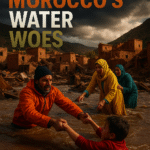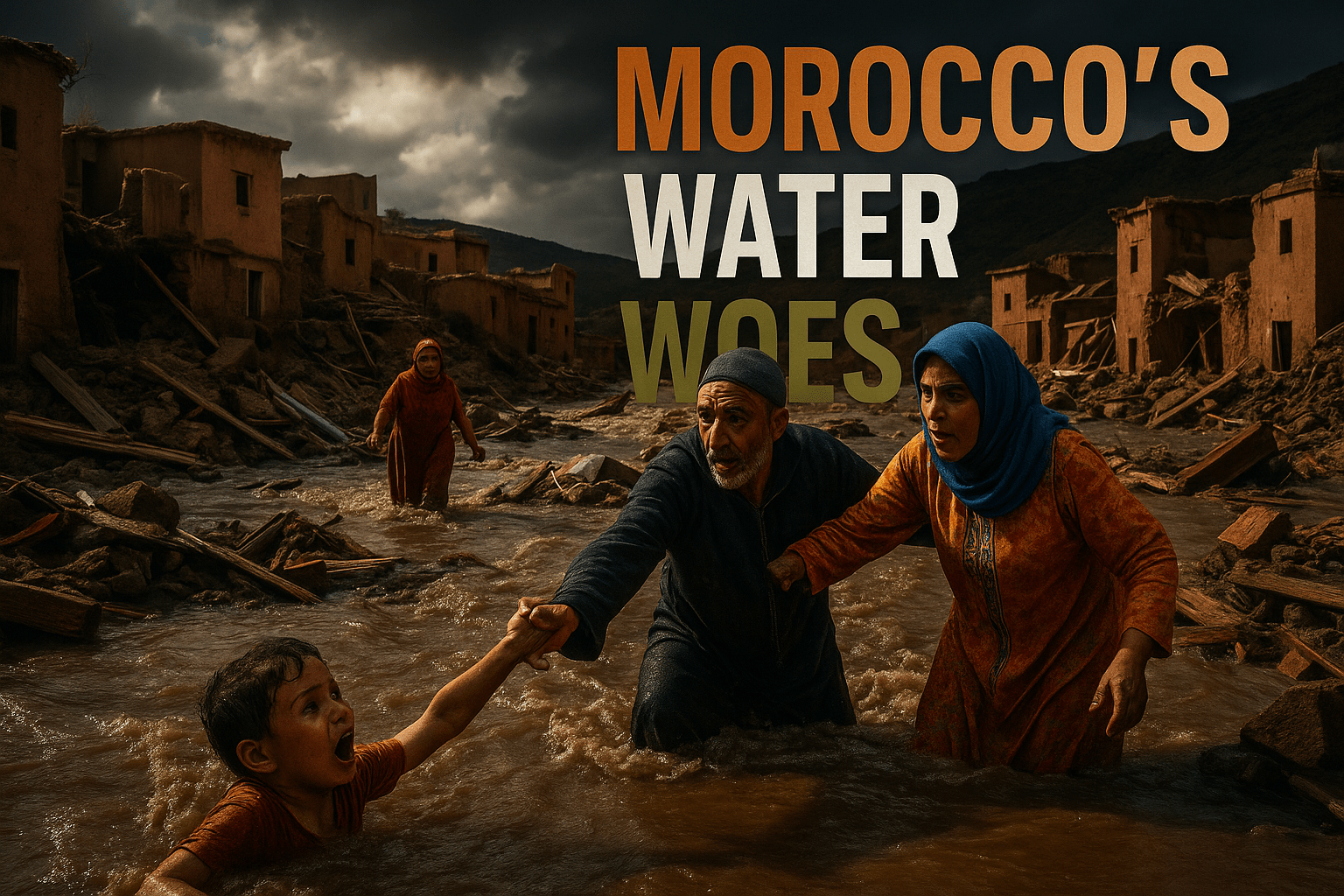

Morocco's Water Woes and Resilience
By Darius Spearman (africanelements)
Support African Elements at patreon.com/africanelements and hear recent news in a single playlist. Additionally, you can gain early access to ad-free video content.
Flash Floods Batter Moroccan Regions
Morocco has recently faced significant challenges due to severe weather events. On a Tuesday evening, heavy thunderstorms and intense rains unleashed flash floods across the provinces of Agouatim and Moulay Brahim in the Al Haouz region (Morocco.direct.news). These deluges caused chaos in valleys like Ghghaya and Bahja, transforming peaceful landscapes into raging torrents.
The impact was immediate and devastating. Cars were swept away, and homes in the village of Akni became submerged (Morocco.direct.news). Traffic between Marrakech and Moulay Brahim came to a standstill, and local shops and residences suffered considerable damage (Morocco.direct.news). In response, authorities quickly mobilized equipment to undertake emergency repairs and restoration work. Furthermore, the Imlil region experienced similar destruction, with powerful torrents carrying massive boulders and tree trunks. These forces of nature devastated crops and washed away entire sections of roads (Morocco.direct.news). The Drâa-Tafilalet region also saw major roads cut off by floods, paralyzing traffic and leaving many vehicles stranded in the sand (Morocco.direct.news).
Morocco's Dual Climate Challenge
Morocco faces a unique and challenging climate reality, grappling with both severe floods and persistent droughts. This dual threat necessitates robust monitoring and early warning systems. An experimental system, the Morocco Flood and Drought Monitor, has been developed to provide early warnings for both flood and drought conditions across the country (hydrology.soton.ac.uk). This innovative system is a collaborative effort, developed by the Princeton Climate Institute (PCI) in partnership with the University of Southampton and Princeton University, with crucial funding from the UNESCO Intergovernmental Hydrology Programme (IHP) (hydrology.soton.ac.uk).
The monitor utilizes a sophisticated approach, integrating ground, satellite, and modeled datasets to create a consistent, near real-time picture of hydrological conditions (hydrology.soton.ac.uk). It provides forecasts up to seven days for floods and up to six months for droughts, offering valuable lead time for preparedness (hydrology.soton.ac.uk). This system is fully operational and updates daily, running a hydrological model at a five-kilometer resolution. This model is driven by a hybrid reanalysis-satellite dataset that includes precipitation and temperature data (hydrology.soton.ac.uk). While the system is in place, details on how these early warnings are communicated to the public and authorities remain unclear. The weather forecast for September 2025 indicates predominantly sunny days across Morocco, including the Marrakesh-Safi region, suggesting that while flash floods can occur, they are not a constant feature of the September climate (easeweather.com).
Morocco's Climate Monitoring Capabilities
Drought's Grip on Agriculture and Economy
The recent drought conditions have severely impacted Morocco's agricultural sector and, by extension, its economy. For example, the scarcity of sheep due to drought has driven up prices significantly ahead of Eid (Morocco.direct.news). Moroccan sheep are now costing between 73 and 83 Dirhams per kilogram, making the average sheep quite expensive (Morocco.direct.news). This situation highlights the vulnerability of local communities whose livelihoods depend heavily on agriculture and livestock.
In response to these challenges, Morocco is actively seeking innovative solutions. In Benguérir, the country is leveraging its unique climatic conditions to address local agricultural challenges (Morocco.direct.news). This initiative aims to combat global hunger and climate change by harnessing “forgotten crops,” which are likely more resilient to changing weather patterns (Morocco.direct.news). These efforts are crucial for ensuring food security and economic stability in the face of increasing climate variability.
Striving for Water Autonomy
Morocco is making significant strides towards achieving water autonomy, a critical goal given its susceptibility to both floods and droughts. The OCP Group, a major Moroccan company, achieved water autonomy two years ahead of schedule (Morocco World News). This remarkable accomplishment was made possible by the commissioning of a historic 203-kilometer desalinated water pipeline (Morocco World News). Such infrastructure projects are vital for securing a stable water supply, especially in a region prone to water scarcity.
These advancements in water management are part of a broader strategy to mitigate the risks associated with climate change. By investing in desalination and other water-saving technologies, Morocco is building resilience against future droughts and ensuring the availability of water for agriculture, industry, and its growing population. This proactive approach is essential for long-term sustainability and economic development.
Government Aid Pledges for Earthquake Victims
Challenges in Aid Distribution
The recent earthquake in Morocco brought immense devastation, and the subsequent heavy rains have compounded the suffering of victims. In the Atlas Mountains, earthquake survivors' camps transformed into muddy pools, with makeshift shelters flooding (newarab.com). Since March 9th, intense downpours have battered the North African country, flooding streets and damaging power grids in towns and villages already struggling with fragile infrastructure (newarab.com). This combination of natural disasters has made aid distribution and recovery efforts incredibly challenging.
The Moroccan government pledged significant financial aid to affected families. Those whose homes were completely destroyed were promised 140,000 dirhams (approximately $14,000), while those with partial damage were allocated 80,000 dirhams (approximately $8,000) (newarab.com). However, the effectiveness and scope of the emergency response, as well as the management of aid distribution, particularly in flood-affected and earthquake-affected areas, remain unclear. The United States has reaffirmed its commitment to support Morocco's earthquake recovery efforts, indicating some level of international cooperation in disaster response (Morocco World News).
Technological Advancements and Global Ties
Morocco is not only addressing environmental challenges but also actively engaging in technological advancements and strengthening its international relations. The country has begun integrating artificial intelligence (AI) into its court systems (Morocco.direct.news). This move signifies a commitment to modernizing its judicial processes. Furthermore, Rabat hosted the first African high-level forum on Artificial Intelligence, which concluded with the “Rabat Consensus,” highlighting Morocco's leadership in the emerging AI landscape on the continent (Morocco.direct.news).
In terms of global reach, Morocco's e-visa platform has attracted half a million applicants, reinforcing its growing international presence (Morocco World News). The nation is also fostering strong military and diplomatic ties. New York National Guardsmen recently strengthened their bond with allies in Morocco during an exercise that involved over 8,100 participants from 27 nations and NATO (Morocco.direct.news). Additionally, Morocco's Lower House Speaker held talks with the Korean Prime Minister in Seoul, underscoring the country's expanding diplomatic network (Morocco.direct.news). A strategic alliance between Liquid Intelligent Technologies and MEDI TELECOM, a Moroccan division, has been established to boost connectivity and enhance network coverage across Morocco (Morocco.direct.news).
Key Areas of Moroccan Focus
Addressing Internal and External Challenges
Morocco is actively confronting various internal and external challenges, including security threats and environmental concerns. The Central Bureau of Judicial Investigations (BCIJ) in Morocco recently arrested four Daesh supporters, demonstrating the nation's commitment to combating terrorism (Morocco.direct.news). This proactive approach helps maintain national security and stability. However, the country has also faced tragic incidents, such as a market fire in central Morocco that resulted in five deaths and 37 hospitalizations (Morocco.direct.news). Additionally, a separate incident involving homemade liquor led to eight deaths and 114 hospitalizations (Morocco.direct.news).
Environmental issues also pose significant challenges. On the Moroccan Mediterranean coast, hundreds of boats equipped with large nets, known as purse seines, are engaged in fishing (Morocco.direct.news). This practice has created a complex situation where both dolphins and fishers face adverse consequences (Morocco.direct.news). These incidents highlight the multifaceted nature of the challenges Morocco navigates, from security threats to public health crises and environmental sustainability issues. The nation continues to work towards comprehensive solutions to ensure the well-being of its citizens and the preservation of its natural resources.
ABOUT THE AUTHOR
Darius Spearman has been a professor of Black Studies at San Diego City College since 2007. He is the author of several books, including Between The Color Lines: A History of African Americans on the California Frontier Through 1890. You can visit Darius online at africanelements.org.
